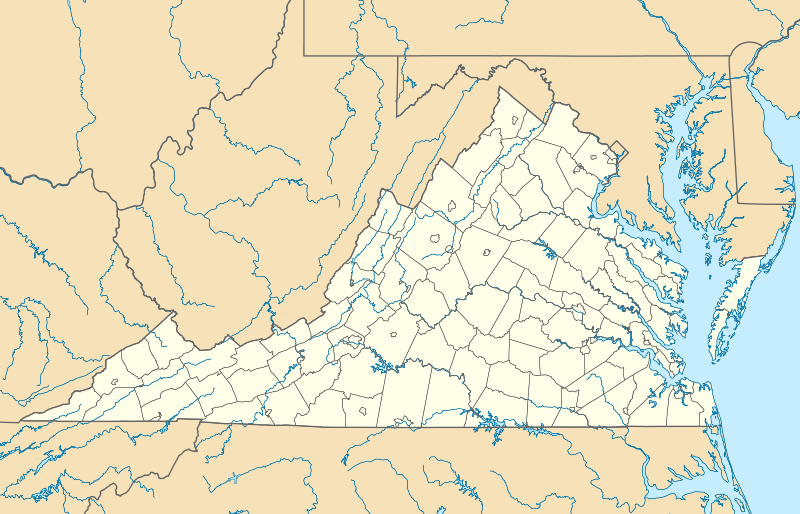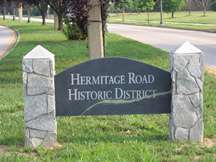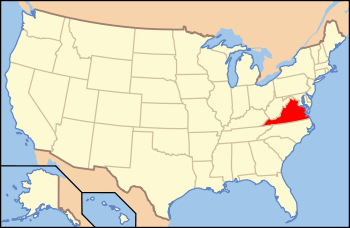Hermitage Road Historic District
|
Hermitage Road Historic District | |
|
HRHD sign near the Laburnum and Hermitage intersection | |
 | |
| Location |
3800-4200 blks of Hermitage Rd. Richmond, Virginia |
|---|---|
| Coordinates | 37°35′2.94″N 77°27′45.17″W / 37.5841500°N 77.4625472°WCoordinates: 37°35′2.94″N 77°27′45.17″W / 37.5841500°N 77.4625472°W |
| Built | 1894 |
| Architect | D. Wiley Anderson |
| Architectural style | Late Victorian, Late 19th and 20th Century Revivals |
| NRHP Reference # | 06000031[1] |
| VLR # | 127-6076 |
| Significant dates | |
| Added to NRHP | February 09, 2006 |
| Designated VLR | December 7, 2005[2] |
Hermitage Road Historic District (HRHD) is a Northside neighborhood in the independent city of Richmond, Virginia. The district is a Richmond Old and Historic District, as well as being listed on the Virginia Landmarks Register and the National Register of Historic Places.
The historic district consists of properties built in different architectural styles (Victorian, Tudor, Arts and Crafts, Georgian, Colonial Revival, etc.) located in the 3800 to 4300 blocks of Hermitage Road, this portion of which is designated as State Route 161, which crosses over Interstate 95 at the north end of the 4300 block.[3]
Boundaries
The south end of the district is marked by the A.P. Hill Monument located in the center of the intersection of Laburnum Avenue and Hermitage Road. This monument is the only one of its type in Richmond (The City of Monuments) under which the subject individual is actually interred.
Also at the south end of the district is the 13 Acres house, which was donated by the Blair family with the intention of providing a permanent green space in the city. The house is currently used by the Richmond Public School system.
The north end of the district is at the intersection of Hermitage Road and Westbrook Avenue near the Freeman Marker No. 34, which marks the outer defense line for the City of Richmond during the Civil War.
Origins of the neighborhood
The area was originally developed as one of Richmond's Northside streetcar suburbs. Most of the original concrete poles used for the overhead trolley wiring are still located in the median of the street and are still in service after over 100 years. The streetcar line extended to Lakeside Park in Henrico County, terminating at the present site of Lewis Ginter Botanical Garden.[3]
Creation of the Historic District
In 1988, the historic district was formed in response to a move by a local organization to tear down two historic houses (one, an excellent example of the Romanesque Revival style, was built in the 1890s). The people of the neighborhood "blocked the wrecking ball" and quickly formed a City Old and Historic District. The goal of the district is the protection and preservation of historic resources through zoning enforcement along Hermitage Road.[3]
The HRHD Association continues to have active participation from homeowners and cooperates with other nearby neighborhood associations, such as Bellevue and Rosedale.
References
- ↑ National Park Service (2008-04-15). "National Register Information System". National Register of Historic Places. National Park Service.
- ↑ "Virginia Landmarks Register". Virginia Department of Historic Resources. Retrieved 19 March 2013.
- 1 2 3 Lisa C. Wood; Bonnie Alberts; Catherine Easterling; Robert Taylor; Sevanne Steiner; Jean McRae (April–October 2005). "National Register of Historic Places Inventory/Nomination: Hermitage Road Historic District" (PDF). Virginia Department of Historic Resources. and Accompanying three photos
External links
- National Park Service
- Historic Richmond Foundation
- Google Maps
- Virginia Department of Historic Resources
- National Register of Historic Places Database
- Freeman Markers


